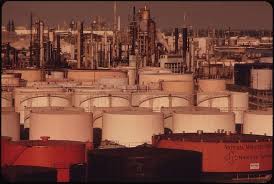Storage Tanks in Louisiana: Challenges and Solutions in the Gulf Region

Address challenges of storage tanks in Louisiana’s Gulf region with stringent regulatory compliance, advanced corrosion prevention methods, cutting-edge leak detection systems, thorough emergency response planning, and embracing technological innovations. Ensure regular inspections, adherence to guidelines, and swift corrective actions. Implement corrosion prevention strategies, advanced coating technologies, and IoT integration for early detection. Focus on environmental impact, safety protocols, and data analysis for enhanced operational efficiency. The integration of these solutions is crucial for the sustainable maintenance and longevity of storage tanks in the Gulf region.
Regulatory Compliance
To ensure regulatory compliance for storage tanks in Louisiana’s Gulf Region, it’s crucial to conduct regular inspections and adhere to state and federal guidelines. Compliance auditing is a key component in verifying that storage tank facilities meet the necessary regulatory standards.
Regular audits help in identifying any areas of non-compliance, allowing for timely corrections to be made. It’s essential to stay informed about regulatory updates to ensure that storage tank operations align with the latest requirements.
Corrosion Prevention
Implementing an effective corrosion prevention strategy is crucial for maintaining the integrity and longevity of storage tanks in Louisiana’s Gulf Region. Two key methods commonly used in the industry are cathodic protection and coating systems.
Cathodic protection involves the application of a sacrificial anode or impressed current system to protect the tank’s metal surface from corroding. This method is particularly effective in areas with high soil resistivity, like those found in the Gulf Region.
In addition to cathodic protection, coating systems play a vital role in preventing corrosion. These systems act as a barrier between the tank’s metal surface and the corrosive elements in the environment. Proper surface preparation, including cleaning and priming, is essential for the success of coating systems. Regular inspection and maintenance of these coatings are necessary to ensure their continued effectiveness.
Leak Detection Systems
You need to consider the benefits of advanced sensor technology and the remote monitoring capabilities they offer when implementing leak detection systems for storage tanks in the Gulf region.
These technologies can provide real-time data on potential leaks, allowing for quick response and mitigation measures.
Advanced Sensor Technology
Advanced sensor technology plays a crucial role in enhancing leak detection systems for storage tanks in Louisiana’s Gulf region.
1. Sensor Integration: By seamlessly integrating advanced sensors within the tank infrastructure, real-time data on temperature, pressure, and fluid levels can be continuously monitored.
2. Data Analytics: Utilizing sophisticated data analytics software, the collected information is processed to identify patterns, anomalies, and potential leaks promptly.
3. Early Detection: With the aid of advanced sensor technology, even minor fluctuations in tank conditions can be detected early, allowing for swift response and prevention of catastrophic events.
This combination of sensor integration and data analytics not only enhances the safety and efficiency of storage tank operations but also provides peace of mind to stakeholders in the Gulf region.
Remote Monitoring Capabilities
Enhancing the efficiency of leak detection systems for storage tanks in Louisiana’s Gulf region involves leveraging remote monitoring capabilities to ensure prompt identification of any potential issues. By implementing advanced data analytics, operators can remotely access real-time information about the tanks, enabling quick response to any anomalies. This proactive approach significantly reduces the risk of leaks and minimizes environmental impact.
Additionally, remote monitoring enhances asset management by providing insights into the performance and condition of the storage tanks. Through continuous remote surveillance, operators can optimize maintenance schedules and predict potential failures, ultimately improving the overall reliability of the storage tank system in the Gulf region.
Environmental Impact
What’re the key environmental impacts associated with storage tanks in Louisiana’s Gulf region?
1. Marine Life: The presence of storage tanks in Louisiana’s Gulf region poses a significant threat to marine life. Spills or leaks from these tanks can release harmful substances into the water, leading to contamination and endangering the delicate ecosystems of the Gulf. Marine species can suffer from direct exposure to pollutants, affecting their health and reproductive capabilities.
2. Soil Contamination: Storage tanks have the potential to cause soil contamination in the surrounding areas. Leaks or improper disposal of tank contents can seep into the soil, contaminating it with hazardous chemicals. This contamination can have far-reaching consequences, impacting not only the immediate vicinity but also potentially spreading to other areas through groundwater movement.
3. Air Pollution: In addition to water and soil contamination, storage tanks can also contribute to air pollution. Evaporation of volatile substances stored in tanks can release harmful gases into the atmosphere, affecting air quality and posing risks to human health and the environment. Implementing proper maintenance and monitoring practices is crucial to mitigate these environmental impacts and protect the Gulf region’s delicate ecosystems.
Emergency Response Planning
When considering Emergency Response Planning for storage tanks in Louisiana’s Gulf Region, it’s crucial to assess the effectiveness of drill exercises and evaluate the response plan thoroughly.
By analyzing the outcomes of drill exercises, you can identify strengths and weaknesses, allowing for targeted improvements in emergency preparedness.
Ensuring that response plans are regularly reviewed and updated based on these evaluations is essential for maintaining a high level of readiness in the face of potential emergencies.
Drill Exercises Effectiveness
How can drill exercises be effectively utilized in emergency response planning for storage tanks in Louisiana’s Gulf Region? Conducting drill exercises is crucial for refining emergency response plans and ensuring preparedness.
Here are three ways to enhance the effectiveness of these exercises:
1. Scenario Diversity: Incorporate a range of realistic scenarios such as leaks, fires, or natural disasters to test response strategies comprehensively.
2. Feedback Mechanisms: Implement robust feedback mechanisms to gather insights from participants and observers, enabling the identification of strengths and areas for improvement.
3. Regular Reviews: Conduct regular reviews of drill exercises to track progress, update response plans, and enhance overall preparedness for potential emergencies.
Response Plan Evaluation
To evaluate the effectiveness of response plans in emergency planning for storage tanks in Louisiana’s Gulf Region, analyzing past drill exercises can provide valuable insights into areas for improvement and readiness levels. By reviewing the response plan implementation during these drills, strengths and weaknesses can be identified. It’s crucial to assess how well the response plans align with regulatory requirements and industry best practices.
Evaluating the response plan effectiveness involves measuring response times, coordination among stakeholders, communication protocols, and resource allocation. Identifying gaps in the response plan can lead to targeted improvements, ensuring that the plans are robust and comprehensive. Regularly evaluating and updating response plans based on these evaluations is essential to enhance preparedness and mitigate risks effectively.
Technological Advancements
Numerous technological advancements have revolutionized the design and maintenance of storage tanks in Louisiana’s Gulf Region. These advancements have significantly enhanced the efficiency and safety of storage tank operations. Here are three key technological advancements that have made a substantial impact:
1. Data Analytics: Implementing advanced data analytics tools allows for real-time monitoring of various parameters such as temperature, pressure, and corrosion levels. By analyzing this data, operators can predict potential issues before they escalate, enabling proactive maintenance and minimizing downtime.
2. IoT Integration: The integration of Internet of Things (IoT) devices enables remote monitoring and control of storage tanks. IoT sensors can provide valuable insights into tank conditions, alerting operators to anomalies or deviations from set parameters. This real-time data transmission enhances decision-making processes and improves overall operational efficiency.
3. Advanced Coating Technologies: Innovations in coating technologies have significantly extended the lifespan of storage tanks by providing enhanced corrosion protection. These advanced coatings not only improve durability but also reduce maintenance costs and environmental risks associated with tank failures.
Maintenance Best Practices
Implementing stringent maintenance best practices is crucial for ensuring the longevity and optimal performance of storage tanks in Louisiana’s Gulf Region. Inspection procedures play a vital role in identifying potential issues before they escalate. Regular visual inspections, non-destructive testing, and monitoring systems are essential to detect corrosion, leaks, or structural weaknesses promptly. These inspections should be conducted at scheduled intervals and after any significant weather events or operational changes.
When it comes to repair techniques, swift action is key to preventing further damage. Repairs should be carried out by certified professionals using approved methods to maintain the structural integrity of the tank. Common repair techniques include welding, patching, and corrosion mitigation. It’s imperative to follow industry standards and manufacturer guidelines during the repair process to ensure compliance and effectiveness.
Training and Safety Protocols
Ensuring proper training and adherence to safety protocols is fundamental for maintaining the operational integrity of storage tanks in Louisiana’s Gulf Region. To achieve this, consider the following:
1. Training Effectiveness: Regularly assess the effectiveness of training programs for personnel involved in storage tank operations. Provide opportunities for hands-on training and simulations to enhance practical skills and knowledge retention. Encouraging continuous learning and skill development can lead to a more competent workforce.
2. Safety Culture: Foster a culture where safety is prioritized at all levels of the organization. Encourage open communication about safety concerns and near-misses to promote a proactive approach to risk management. Recognize and reward individuals who exemplify a strong commitment to safety, reinforcing the importance of a safety-first mindset.
3. Regular Safety Audits: Conduct routine safety audits to identify potential hazards and areas for improvement in safety protocols. Implement corrective actions promptly to address any deficiencies and prevent incidents. Engaging employees in the audit process can enhance their ownership of safety practices and contribute to a safer work environment.
Conclusion
In conclusion, addressing the challenges facing storage tanks in Louisiana requires a comprehensive approach that includes:
– Regulatory compliance
– Corrosion prevention
– Leak detection systems
– Environmental impact assessments
– Emergency response planning
– Technological advancements
– Maintenance best practices
– Rigorous training and safety protocols
By implementing these solutions, the Gulf region can better protect its storage tanks, minimize environmental risks, and ensure the safety of surrounding communities. Vigilance and proactive measures are essential to safeguarding these critical infrastructure assets.
Apart from that, if you want to know about Expense Management for Businesses Then please visit our Business category.

